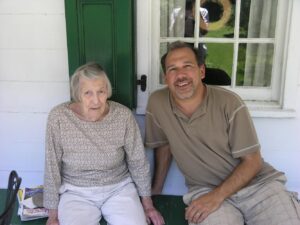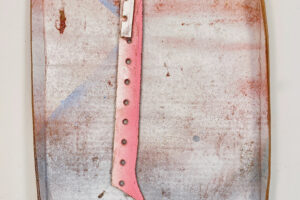Literature has been the salvation of the damned, literature has inspired and guided lovers, routed despair and can perhaps in this case save the world. – John Cheever

We lived in Ossining. I was about 13 years old and had decided that I wanted to be a writer (especially if the baseball player thing didn’t work out). When I announced this to my parents, my mom suggested I write a neighbor of ours to see if he might be able to supply some professional guidance. His name was John Cheever, and all I knew of him was that my parents loved his writing and several of his books were on the shelves in our living room library (The Wapshot Chronicleis the one that jumps out in my mind). My mom’s idea seemed reasonable enough so I wrote Mr. Cheever a short note asking if I might be able to ask him a few questions some day. Just a couple of days later, the following letter arrived at our house:
Dear Chris Epting:
It is nice to know that there is another writer living in the neighborhood. I will call you one day soon and then maybe we can take a walk and talk about writing.
(signed)John Cheever
And the very next day, he called my house. “Yes, Chris…” a rich New England-accented voice began, “this is John Cheever.” What a unique way to be introduced to one of the greatest fiction writers in American literary history.
Armed with a few school writing samples, I went to his house the next day and spent several hours there. I listened to him, I asked questions, I watched him smoke tons of filterless cigarettes, I drank Coke and I listened to his Beatles records with him. But then it was time for Little League practice. But it was okay. I’d be back many other times in the next several years to talk about writing.
John Cheever became a mentor to me until his death in 1982. He’d review my work, (scribbling copious notes in red felt tip marker across my pages), take the occasional walk with me and once even personally called a professor at my college to recommend me for a much-in-demand writing course. Naturally the call helped secure my place in the class (it had been his idea to call after I described the situation) and it wasn’t until later in life that I could appreciate the absurdity of the moment: a pompous college English professor with his own dreams of becoming a great American novelist getting a call from one of the true lions of American fiction to vouch for student.
John Cheever lived in Ossining from 1951 until the time of his death. Over the years, the Quincy, Massachusetts, native became iconic in his adopted town. He taught at Sing Sing prison, was part of a regular salon-style dinner group for years and even did readings at the local public library. Cheever was such a regular at the Highland Diner that his photo hung there, shrine-like for years after his death.
Once I’d known him for a couple of years, it finally hit me who he was – and what he represented to people. I was in the supermarket with my mom and at the checkout stand, there was that elegant, weathered face, on the cover of Newsweek magazine (after he’d won the Pulitzer Prize for his novel, Falconer). I was seeing Cheever later that day so I brought the copy with me. In his office, I showed it to him. He just nodded and I asked him something. I explained to him that when I first visited, I was not familiar with him. But now, over time, and especially with this magazine, it was clear to me he was very important. So I wanted to know: why grant me, a kid in the neighborhood, all of this precious time?
He laughed a little at that and explained that since his drinking problems in the last few years, he had looked for therapeutic outlets that might help him focus – and that helping a young writer was almost like medicine. (I learned later that he was completely dry the last seven years of his life – and those were the years I knew him). In addition to visiting at his home, I called him from college to chat from time to time. I’d bump into him taking long walks down Spring Valley Road on lazy summer days (or riding his beloved bicycle) and he’d always stop to talk and catch up.
I spoke to John Cheever less than two weeks before he died. I was away at school and while I knew he was ill with cancer, I didn’t know just how sick he was. There was an article I wanted to write about him and on the phone, in a ravaged voice, he told me as soon as he was feeling better we could talk more about it. Then I turned on the news one morning soon after and saw he was gone.
In his lifetime, Cheever won the Pulitzer Prize, the National Book Award, and the National Medal for Literature. His short stories and novels, including The Wapshot Chronicle, The Wapshot Scandal, Bullet Park, and Falconer (inspired by writing classes he taught at Sing Sing) remain vital examples of some of the world’s best 20th century fiction.
If you ever get the chance to visit Ossining, wherever you are in the village, know that he was probably right nearby at some point. If you make your way to the serene Teatown Lake near his home, be aware that he paused there along the road by the water more than once to sit by the rocks and talk to this young writer about craft and critique, while also mixing in a fair amount of baseball chatter. Further on down the woodsy road, at the Teatown Lake Reservation, the ancient stone walls where Cheever would stop and rest are still there and everything remains as it was when he was here – exactly as I remember it as a teenager.






